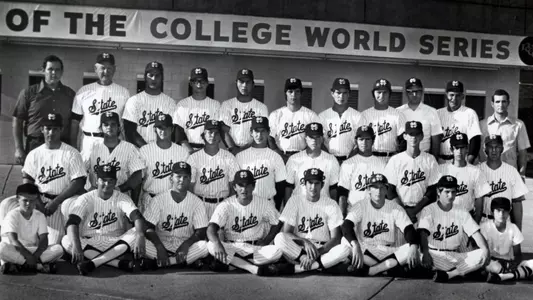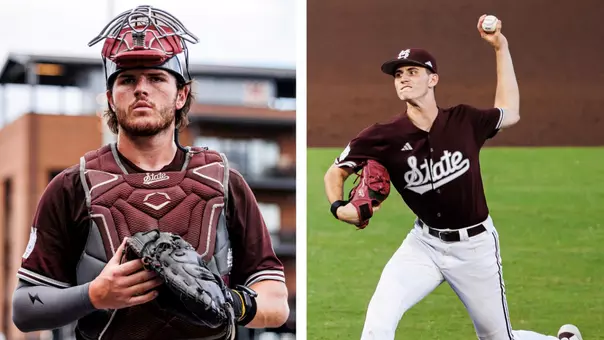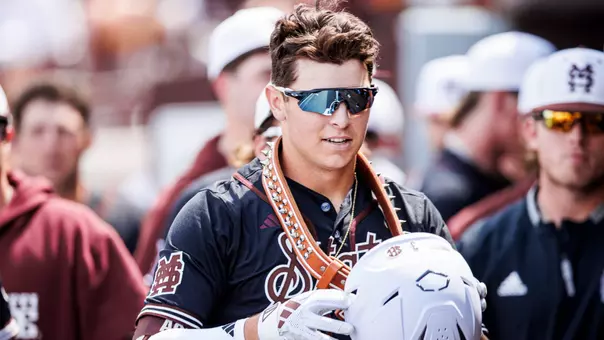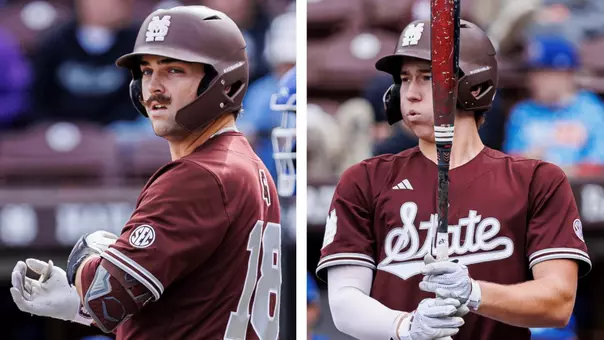
Setting The Standard
April 19, 2024 | Baseball, Joel Coleman
Mississippi State’s 1971 baseball team made Omaha the year-after-year goal for the program.
STARKVILLE – Friday night, just before Mississippi State baseball battles Auburn, a group of men will step out onto Dudy Noble Field. If you happen to be inside the ballpark, don't miss it, for these won't be just any ordinary men.
In fact, these men will be the very reason the thousands that'll give them applause now expect year after year for the Diamond Dawgs to be right in the thick of the hunt for a June trip to Omaha, Nebraska.
On Super Bulldog Weekend, a super reunion is in store. Members of MSU's 1971 team – the first State squad to ever earn a College World Series berth – will be back in town to celebrate a 50-year reunion that was delayed about three years due to COVID-19. No matter how much time passes though, there's no denying this bunch of Bulldogs set the State baseball standard.
"We had great players," Former Bulldog left fielder and 1971 All-SEC selection Ted Milton said. "There's an old saying, 'You can't win the Kentucky Derby with a mule.' But we had some thoroughbreds that could go."
Thoroughbreds like Milton, who finished the '71 campaign hitting .312 with seven home runs and 32 runs driven in that year. Milton was second in homers and RBIs on the squad to only All-American third baseman Phil Still, who hit at an amazing .351 clip with 11 dingers while knocking in 37 runs.
Oh, but the list of '71 State stars goes on and on. You can talk about the three other All-SEC selections – pitchers Mike Proffitt and Jerry Thompson, as well as shortstop Bobby Croswell. Then there was catcher Bruce Irvin who was chosen to the All-SEC Western Division team.
It's easy to focus on the big names, but according to Milton, the reality was it wasn't just a few guys that made the Bulldogs great. It was the totality of the group.
"What made us good, we all lived in the dorm," Milton explained. "We saw each other 24/7. When everyone else was going home for spring break, we were on campus together. We were either in the dorm together, on the baseball field together or on the bus together. That helps out. There was no individuality on that team."
Combine talent and unity with a couple of other factors including a strong coaching staff and a point to prove, and you start to piece together why these Bulldogs put together the unforgettable run they did.
Start with the leaders.
"We were fortunate to have two great coaches – Coach [Paul] Gregory as the head coach and Tom D'Armi as the assistant," Milton said. "They were two totally different people.
"Coach Gregory was a little laid back. He worked with the pitchers and stayed away from the infielders and outfielders. The pitchers had it easy. He'd work with them and let them go in early and [the rest of us] would stay two hours longer. [Gregory] just said go play. It was kind of a professional atmosphere. He played pro ball, and it was like, 'You go play and if you do the job, you play. If you don't, come sit with me.'"
Fortunately for Gregory, he seemingly didn't have too much motivating to do with Milton and his teammates in 1971. It was an especially driven group.
Why, you ask? Many of the Bulldogs were returners from MSU's 1970 SEC championship team who were still a bit salty about how their season ended the year before.
"The 1970 team was the best team," Milton said. "A lot of people don't know that, but we were very, very good. It was the best team I ever played on, and I played on a lot of teams."
Unfortunately, the '70 squad's Omaha hopes got derailed when the NCAA deemed four Bulldog standouts – pitchers Dennis Hall and Brantley Jones plus starting first baseman Jocko Potts and starting third baseman Bill Rorie – unavailable for the NCAA Tournament due to an eligibility issue. The NCAA didn't allow for freshmen to play varsity sports at this point in time, while the SEC did. So, since Hall, Jones, Potts and Rorie had all played previously as freshmen, their playing clocks had already ran out per the NCAA rule.
The '70 Diamond Dawgs still nearly overcame their obstacle, reaching the District III Tournament final before falling 5-4 to Florida State. The defeat provided a sour taste that lingered into '71.
"We felt like we got robbed," Milton said. "So, we had a little chip on our shoulders."
The rest of the story became Bulldog history. State was swept by LSU to begin SEC play in '71 but barked and bit right back to go on and capture the school's second-straight conference championship. The Bulldogs then punched a ticket to Omaha in dramatic fashion.
MSU's Dave Phares cranked a walk-off, three-run homer to lift the Diamond Dawgs to a 5-2 win over Georgia Tech in the District III Tourney championship. Finally, for the first time since the event began in 1947, Mississippi State was headed north to Nebraska to play in the College World Series.
And while the Bulldogs saw their special season end with losses to Tulsa and BYU in Omaha, there was no doubt that the bar had been raised for Mississippi State.
"I thought with Gregory and D'Armi, we might've been the ones who started the lifting up [of MSU baseball]," Milton said. "We won two SEC championships, and what people don't understand, back then, if you didn't win the SEC, you didn't go anywhere."
Well State baseball has certainly gone plenty of places since. 1971 was the first of what's now 12 different MSU trips to Omaha. The Bulldogs of course won the College World Series and claimed the school's first national championship in 2021.
Title-winning seasons are now the hope every single spring in Starkville. And in many ways, it's the group that'll be grinning ear to ear in their pregame recognition Friday night that allowed Bulldogs everywhere to dream big.




